Khas
La gente de Khas (en nepalí: खस) son un grupo etno-lingüístico indo-ario que hablan Khas (nepalí) idioma en el día de hoy Nepal y, Kumaon y Garhwal de India. También eran conocidos como 'Parbattias' y 'Paharis'. El término Khas ha quedado obsoleto.
| Khas/Parbattiya/Pahari
खस/पर्वत्या/पहाडी | ||
|---|---|---|
| Idioma | Idioma Khas (nepalí) | |
| Religión |
| |
| Etnias relacionadas | Other Indo-Aryan peoples | |
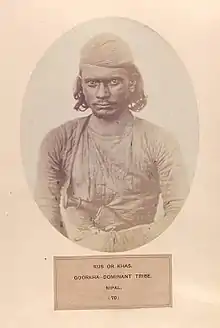
Historia
Han sido conectados a Khasas mencionado en la antigua literatura hindú, así como el reino Khas Malla medieval.[1] Tradicionalmente, la gente Khas fue dividida en Khas Brahmins y Khas Kshatriya (también llamado Khas Rajputs). Debido al poder político del reino de Khas Malla, la gente de Khas tenía alto estatus social.[2]
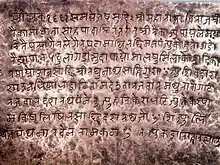
Hasta el siglo XIX, los Gorkhalis se referían a su país como Khas Desh (Khas pais).[3] El Código de Conducta Legal de 1854 ya no se refería a Khas como nación en lugar de jat (o comunidad) en el Reino Gorkha.[4]
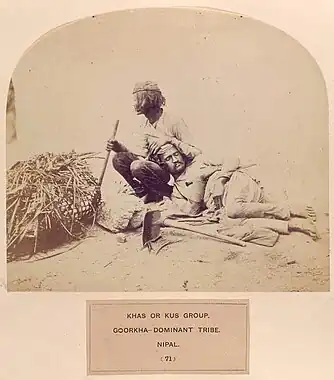 Khas people of Nepal, as depicted in The People of India (1868-1875)
Khas people of Nepal, as depicted in The People of India (1868-1875)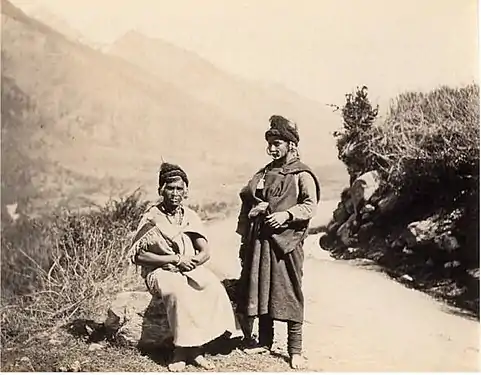 Khas women, photographed in 1880
Khas women, photographed in 1880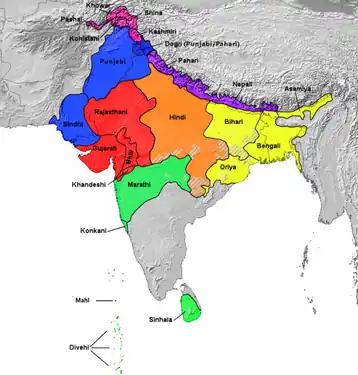 Khas language, shown as a Northern Indo-Aryan language "Nepali" (in purple color)
Khas language, shown as a Northern Indo-Aryan language "Nepali" (in purple color)
Modern
La gente moderna de Khas del día se refiere como Khas Bahun y Khas Chhetri (también Khas Rajput).[2] En la región de Kumaon de la India, la gente de Khas adoptó la designación de Kumaoni Jimdar Rajput.[5]
.jpg.webp) Procession of Nepali Hindu Wedding; groom wears Dhaka dress used only by Khas Parbattia community
Procession of Nepali Hindu Wedding; groom wears Dhaka dress used only by Khas Parbattia community Senior offering Dashain Tika; a feature of Khas Parbattia community
Senior offering Dashain Tika; a feature of Khas Parbattia community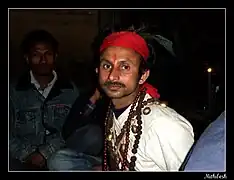 Jhakri, a shamanistic practice evident in modern Khas people in Darjeeling, India
Jhakri, a shamanistic practice evident in modern Khas people in Darjeeling, India
Referencias
- John T Hitchcock, 1978, pp. 112-119.
- John T Hitchcock, 1978, pp. 116-119.
- Richard Burghart, 1984, p. 107.
- Richard Burghart, 1984, p. 117.
- K. S. Singh, 2005, p. 851.
Bibliografía
- Dor Bahadur Bista (1991). Fatalism and Development: Nepal's Struggle for Modernization. Orient Blackswan. ISBN 978-81-250-0188-1.
- John T Hitchcock (1978). «An Additional Perspective on the Nepali Caste System». En James F. Fisher, ed. Himalayan Anthropology: The Indo-Tibetan Interface. Walter de Gruyter. ISBN 978-90-279-7700-7.
- K. S. Singh (2005). People of India: Uttar Pradesh. Anthropological Survey of India. ISBN 978-81-7304-114-3.
- Richard Burghart (1984). «The Formation of the Concept of Nation-State in Nepal». The Journal of Asian Studies 44 (1): 101-125.
- Susan Thieme (2006). Social Networks and Migration: Far West Nepalese Labour Migrants in Delhi. LIT Verlag Münster. ISBN 978-3-8258-9246-3.
- William Brook Northey; C. J. Morris (1928). The Gurkhas: Their Manners, Customs, and Country. Asian Educational Services. ISBN 978-81-206-1577-9.